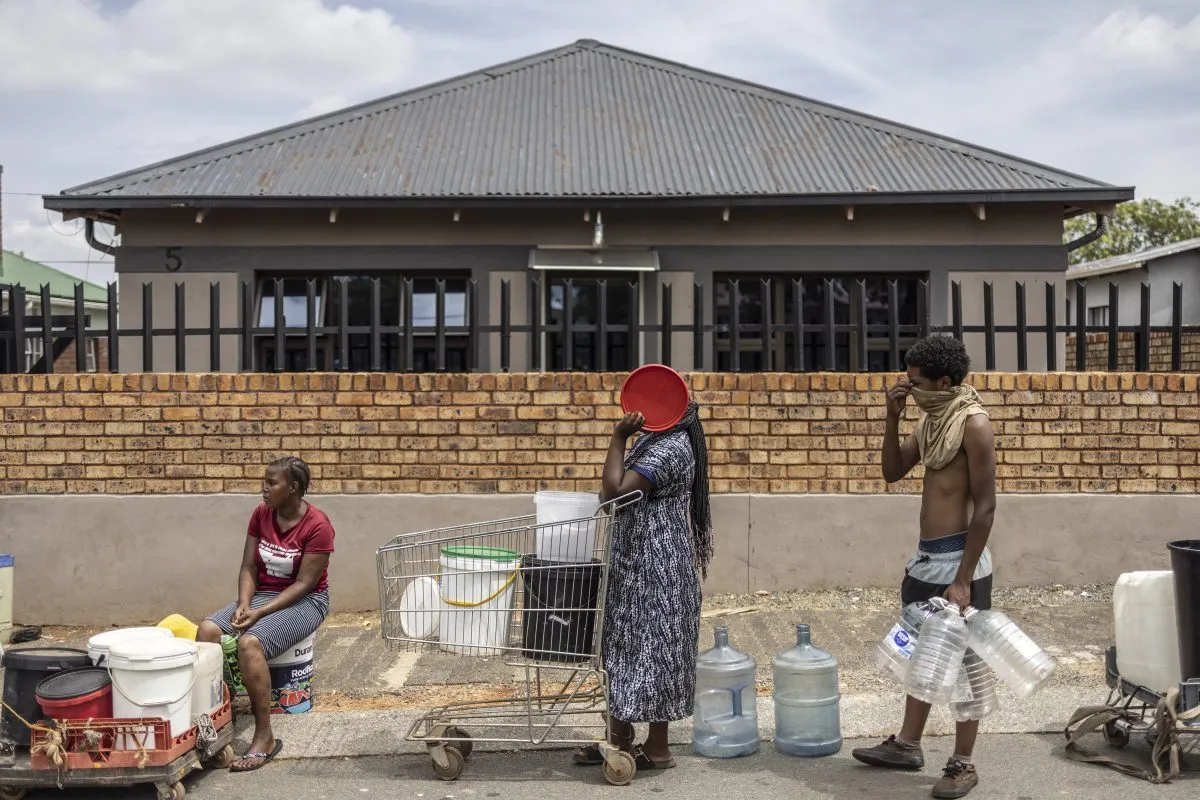Businesses across South Africa are facing a new crisis as interruptions to water supply become increasingly frequent and more severe.
Parts of Johannesburg, the country’s economic hub, have been forced to implement a water equivalent of “load shedding” – the rolling power cuts that the country has long faced – over recent months. Some areas have endured cuts to their water supply lasting up to 86 hours. On Monday, the city’s central business district and dozens of suburbs suffered a complete loss of water as utility company Johannesburg Water conducted “unplanned maintenance” at a pumping station.
The growing crisis now threatens to have a major impact on the country’s economy, just as it is finally showing signs of recovery from the impact of power blackouts.
“It’s critical,” says Alison Groves, discipline lead for built ecology at consulting firm WSP in Africa. “You can always make electricity. With water – if you don’t have any in your pipes and you don’t have any other backup, that’s it. Your business stops.”
No type of business is unscathed by the lack of water. Even office-based firms are affected.
“At my offices, if there’s no water in the building, you can’t use sanitation. So sometimes it’s just easier to send people to work from home,” says Justin Kettle, managing director at advisory firm Kettle Consulting. Business owners are “really concerned,” he adds. “The further we continue with this will lead to a crisis.”
Kicking the can
The taps running dry reflects the increasing prevalence of drought across the region. Last year was the driest on record across much of South Africa. But the crisis is also the outcome of years of mismanagement and under-investment.
Nationwide, over 40% of the water supplied from reservoirs is lost before it reaches customers, according to government data. This is partly because of leaking pipes, but the scale of losses also reflects how illegal connections to water supplies have become widespread in some areas. Criminal “tanker mafias” stand accused of sabotaging water infrastructure in order to receive lucrative emergency contracts to bridge the subsequent supply gap.
Anthony Turton, a professor at the Centre for Environmental Management at the University of the Free State, told African Business that the threat of water shortages has been affecting South Africa’s investment climate for more than two decades.
He notes that the National Water Act, passed in 1998, requires businesses to apply for a water licence every five years – with no guarantee that the licence will be renewed at the end of this period. The Act has “acted as a general dampener on incoming capital,” he says, noting that some large companies have avoided establishing operations in South Africa as a result of uncertainty over water.
The troubled mining industry has also endured material damage due to water shortages in the recent past. Anglo American blamed a 9% drop in platinum production at its Rustenburg operations in 2023 on a five-day water stoppage.
Yet Turton says that understanding of the problem remains surprisingly scarce in the country’s boardrooms.
“I’ve been quite amazed at the lack of understanding at executive decision-making level about the complexity of the water crisis facing some of these companies,” he says. He puts this down to executives being “overwhelmed” by other issues. Companies have been “kicking the can down the road,” he warns, in the hope they will not be badly affected by future shortages.
Can-kicking may not, however, be viable for much longer. Noting that “the manufacturing sector is generally quite precarious,” Turton points to the water-intensive automotive industry as being particularly vulnerable. Several of the country’s main automotive manufacturing hubs – such as those around Gqeberha (Port Elizabeth) and Durban – are in areas that are vulnerable to water shortages.
It is, he says, “very difficult to understand” how automakers could survive a prolonged shutdown caused by interruption to the water supply. Their only hope, he suggests, might be to establish an alternative source of water that could allow them to maintain operations throughout disruption to the mains supply. This, however, like all solutions to the water crisis, will be far from easy to achieve.
Solutions in short supply
There are several ways out of the crisis for South African companies – none of which represent a perfect solution.
Groves says that companies should prioritise monitoring their water usage and address any leaks with urgency. This should be combined, where possible, with capturing and reusing wastewater.
She adds that companies are also increasingly turning to engineering solutions.
“People are more and more putting in buffer tanks,” she says.
Yet while storing water in buffer tanks may improve the resilience of individual businesses and households, it will not necessarily help deal with the overall problem of water shortages.
“Having a buffer tank doesn’t give you the licence to use your water at the same irresponsible rate you might have been using it before,” says Groves, who stresses that any water stored in tanks is taken from a common pool.
Groves is even more sceptical of allowing companies to drill their own boreholes.
“It is totally unregulated. There is no reporting mechanism about how much you’ve extracted and very little oversight on how much has been abstracted,” she says. Excessive drilling of boreholes will deplete the water table, she warns, leading to a host of unintended consequences, including contamination and – in coastal areas – sea water infiltration.
In the absence of good options for engineered solutions, companies may be tempted simply to relocate from the most water-stressed areas. Kettle believes concern over water is a factor driving businesses out of Johannesburg and towards Cape Town.
“You’re not finding a lot of new people wanting to invest in Johannesburg until they see some form of correction in the infrastructure.”
But Cape Town has had its own severe water issues in recent years. The city infamously came close to “Day Zero” in 2018, as a severe drought brought the city’s water supply to the brink of failure.
Turton, meanwhile, reports that he is working with the Platform for a Water Secure Gauteng, which draws the public sector, private sector and civil society together in an effort to strengthen water security. The initiative is attempting to chart a way out of the crisis by attempting to temporarily curtail demand by 10%. This, says Turton, would “buy time” for longer term solutions.
He says he is “cautiously optimistic” that these efforts can succeed, but says success will depend on the stability of the municipal government and on the tanker mafias being brought to justice. Stability has been in short supply in recent years at the municipal level in Johannesburg. The mayor’s office has been a revolving door, with nine separate mayors passing through since late 2019, making coherent policymaking almost impossible.
This chaos has been replicated in Johannesburg Water, an independent company whose sole shareholder is the municipality, the City of Johannesburg. Appointees to the utility are “all comrades,” says Turton.
“They are all people generally without technical skills, and mostly appointed by virtue of a patronage network.”
Water from the mountain kingdom
As for longer term solutions, the national government is pursuing a project with Lesotho to upgrade infrastructure used to transfer water from the mountain kingdom to Gauteng. However, a series of delays mean that the latest phase of the project to pump water into the Integrated Vaal River system is now expected to be completed only in 2028, ten years later than originally planned.
Groves believes that large-scale infrastructure projects need to combine with softer solutions to help replenish ground water. “Certainly in cities, we’ve made our landscapes very much a hardscape situation, so water flows into storm water and away from our cities, but has very little opportunity to sink back into the ground water and replenish it.”
“Ultimately, if we don’t find ways of replenishing our ground water, it does become a finite resource.”
Want to continue reading? Subscribe today.
You've read all your free articles for this month! Subscribe now to enjoy full access to our content.
Digital Monthly
£8.00 / month
Receive full unlimited access to our articles, opinions, podcasts and more.
Digital Yearly
£70.00 / year
Our best value offer - save £26 and gain access to all of our digital content for an entire year!

 Sign in with Google
Sign in with Google 



